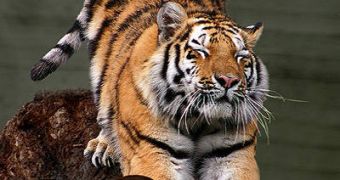For more than a century, zoo keepers around the world have believed that growing animals in captivity implies nothing more than feeding them well and preventing them from exercising, so as not to injure themselves. Now, a growing number of animal experts and zoological garden owners feel that “animal enrichment” programs are the best way to rear for the creatures. In short, they are not given food on a silver platter, but are expected to work for it, thus exercising at the same time.
This is very important, especially in those long winter months, when most species have a tendency to not be very active, and spend large amounts of time doing nothing. It's during these periods that they can easily get very sick, and caretakers are looking into novel ways of ensuring that doesn't happen.
For example, snow leopards and other similar felines are made to claw cardboard boxes, which stimulates both their muscles and their appetite. Inside the boxes, there's usually a meatball or a similar treat, surrounded by hay.
In another example, giraffes exercise their teeth and tongues on Christmas trees, so as not to get too accustomed to the soft leaves that are usually served at zoos. In their natural habitat, they must consume the canopy of some trees that have developed natural defense mechanisms against their seemingly insatiable appetite. Nearly all leaves in them are “packed” with strong thorns, which could theoretically penetrate any soft tissue, such as that of the tongue.
“But in an effort to keep them healthy, we almost made them unhealthy. Zoo animals tended to be overweight, pretty much across the board. Behavioral issues were a much bigger problem because they were idle both physically and mentally,” Roger Williams Park Zoo deputy director for animal programming Tim French explains.
“In the old days, some people viewed what we now call animal enrichment as an unnecessary pain. But now we know a lot more since we've become more sensitive to animals' needs,” Zoo New England president and CEO John Linehan, who is in charge of coordinating the Franklin Park Zoo in Boston, as well as the Stone Zoo, adds.

 14 DAY TRIAL //
14 DAY TRIAL //